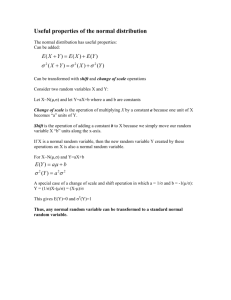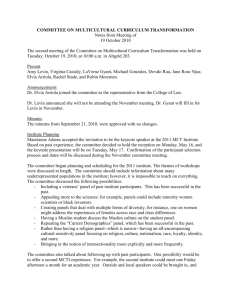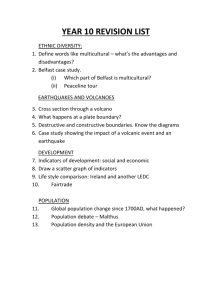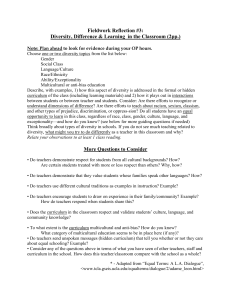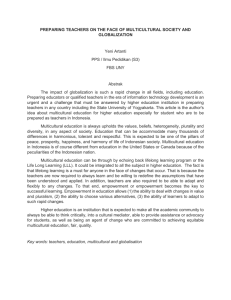Introduction - Northern Illinois University
advertisement
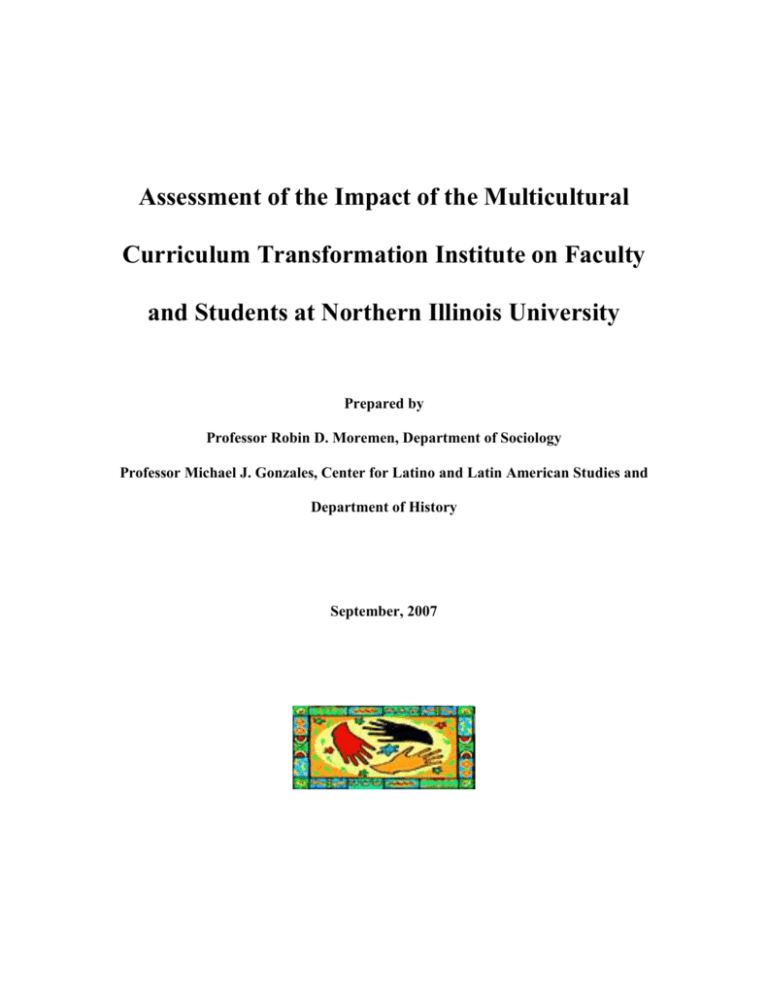
Assessment of the Impact of the Multicultural Curriculum Transformation Institute on Faculty and Students at Northern Illinois University Prepared by Professor Robin D. Moremen, Department of Sociology Professor Michael J. Gonzales, Center for Latino and Latin American Studies and Department of History September, 2007 Forward By Michael J. Gonzales Over a dozen years ago, the Dean of the College of Liberal Arts and Sciences called a meeting of the Directors of Black Studies, Women’s Studies, and the Center for Latino and Latin American Studies. NIU students had been loudly and publicly demanding more undergraduate courses that focused on the experiences of African-Americans, Latinos, and Women, and the university did not have the resources to hire large numbers of additional faculty to offer these classes. So, what could we do about it? The response was to experiment with a summer institute that would help current faculty interested in transforming their courses to integrate information and perspectives indicative of the experiences of minorities and women. No one could predict how the faculty would respond, or if the agitated students would accept this as an answer. Through the years, this first “Multicultural” Task Force has grown from the three Directors to include faculty representatives from most of the colleges on campus as well as administrators from the Provost’s office and the College of Liberal Arts and Sciences. The summer institute was funded from the start by the Provost’s office, and the Directors of the original three units served as rotating Task Force chairs for successive two-year terms.1 I am the sole remaining member of the original three who founded the Multicultural Curriculum Transformation Institute, and I chaired the Task Force last year and will chair it again in Spring, 2008. This year, the Provost’s Office decided to replace the Task Force with a university committee, and I would like to acknowledge the contributions of those long-serving Task Force members who were not selected by the Provost to serve on the new Committee. Special thanks go to Professors Charles Carter, Shi Ruei Fang, William Goldenberg, and Robin D. Moremen. I would also like to thank those long-serving members who will continue as Committee members. They are Professors Virginia Cassidy, Associate Provost, LaVerne Gyant, Director of Black Studies, Murali Krishnamurthi, Director of Faculty Development, and Amy Levine, Director of Women’s Studies. In Fall 2006, Provost Alden asked the Task Force to compile a brief report that would indicate the impact of the summer Institutes on the university’s curriculum. The following assessment demonstrates the Institute’s success. Robin Moremen collected the data and drafted the report, and together we completed the current version. The report is a preliminary assessment that does not do justice to the impact of the summer Institutes, nor does it fully reflect the efforts of Task Force members and Institute participants, panelists, and small group leaders. But it is a clear indication that their collective efforts have been beneficial to faculty and students alike. 1 The Director of Faculty Development also served a single two-year term. 2 Assessment By Robin D. Moremen and Michael J. Gonzales Introduction The Multicultural Curriculum Transformation Institute, which lasts for a week or more during the summer, provides faculty with ideas and resources to make their courses more inclusive of scholarship, theories, concepts, and contributions of people historically underrepresented in the curriculum. This includes persons of diverse racial and cultural heritages, different genders, sexual orientations, social classes, and religions. The Institute also provides fundamental information regarding university policies and services for students with disabilities. The Institute addresses pedagogy by providing a unique forum for discussing important, sensitive, and potentially controversial issues essential to effective classroom instruction and communication with our diverse student body. It also provides a safe environment that invites personal transformation of faculty participants and the opportunity for establishing professional contacts and friendships. The Institute does not ask faculty to abandon traditional texts or classroom techniques, but encourages them to incorporate relevant materials and concepts that will improve their courses and allow them to communicate more effectively with students. In the end, a multicultural curriculum provides a more comprehensive, relevant, and accurate intellectual perspective that prepares students to succeed in a diverse world. During the Institute, information is disseminated and daily discussion occurs through thematic workshops, a plenary session featuring a distinguished authority in the field, and small group meetings that process information and apply it to each participant’s course syllabus. Task Force members organize the Institute and serve as workshop panelists, small group leaders, chairs, and discussion facilitators. Interested faculty, instructors, and administrators apply to participate in the Institute and they must identify a course to transform by incorporating multicultural materials and perspectives.2 Our data reflect the number of Institute participants over a five-year sampling period, together with the courses that they transformed after participating in the Institute. Consequently, the answer to the following question provides only a snapshot of the total number of students exposed to transformed courses over the life of the Institute: How many students at NIU have taken courses that were transformed as a result of the Multicultural Curriculum Transformation Institute? 2 Many participants use the methods and information that they learned at the Institute to transform other courses as well. We collected data on all transformed courses. 3 Methodology Time and staff limitations necessitated restricting our sample to the five-year window from 2001-2006. During that period, the Institute was canceled in 2004 but otherwise took place as scheduled. During these years, eighty-six (86) faculty, staff, and instructors participated in the Institute: YEAR NUMBER OF PARTICIPANTS 18 19 15 20 14 2001 2002 2003 2005 2006 The data show that women composed sixty-two percent (62%) of the participants and men thirty-eight percent (38%). Seventy-eight (78%) of these participants identified themselves as white, and twenty-three (23%) as persons of color. Participants represented six of the seven colleges on campus, as well as several administrative tracks: COLLEGE NUMBER OF PARTICIPANTS 24 (28%) 22 (26%) 15 (17%) 13 (15%) 5 (6%) 4 (5%) 3 (3%) LA&S EDUC BUSI HHS VPA ADMIN ENG We should note that of the eighty-six (86) participants, twelve (12) are no longer at NIU, but we see no significant demographic differences between those who left NIU and those who remained in the sample. On February 15, 2007, the seventy-four (74) participants remaining at NIU received an email via Groupwise requesting their participation in the assessment (please see Appendix 1). Those who had not responded by February 28, 2007 received an email reminder with another copy of the assessment questions. The final response rate was 90.5 percent (67 of 74 responded). The results were entered into an Excel spreadsheet and sent to Institutional Research (IR) on April 3, 2007. IR was asked to provide us with the following information: 1. 2. The total number of students enrolled in all transformed courses for the sample years The number of undergraduates enrolled in all transformed undergraduate courses for the sample years 4 3. 4. The number of graduate students enrolled in all transformed graduate courses for the sample years The number of students enrolled in transformed courses designated as General Education courses for the sample years Institutional Research provided us with the data that we requested on May 10, 2007. Results – Quantitative From 2001 to 2006, a total of 132 courses were transformed. Ninety-three (93) of the transformed courses were at the undergraduate level (100-400); and thirty-nine (39) were at the graduate level (500-600). Eleven (11) of the undergraduate classes were General Education courses. Seven hundred seventy (770) sections of these classes were taught since 2001, with a total enrollment of 19,639 students. As Chart 1 indicates, 80 percent of the students enrolled in the transformed courses were undergraduates (n = 15,667), and 20 percent were graduate students (n = 3,972). Of the undergraduates enrolled in transformed courses, 28 percent (n = 4,390) were students enrolled in General Education classes. As Chart 2 indicates, the majority of undergraduates were impacted by courses in the College of Liberal Arts and Sciences, followed by the College of Business and the College of Health and Human Sciences. The majority of graduate students were impacted by courses in the College of Education, followed by the College of Business and the College of Health and Human Sciences. Approximately 4,000 students per year have taken courses transformed by the Multicultural Curriculum Transformation Institute, representing approximately sixteen percent (16%) of the total student enrollment.3 Of those 4,000 students, approximately one in five (22 percent) have been enrolled in a General Education course. Results – Qualitative Given time, staff, and space limitations, a thorough assessment of the qualitative impact of multicultural transformation is not possible at this time. However, an indication of the qualitative impact is provided by those who responded to our invitation to share their impressions of the effectiveness of their transformation efforts. Nearly one-half of the participants (49 percent) responded, and almost unanimously they expressed satisfaction, surprise, and joy at the positive impact of multicultural transformation on their courses and students. Faculty and students alike clearly benefited from this experience, as the testimony presented in Appendix 2 demonstrates. 3 This estimate is based on an approximate enrollment of 24,000 students per year. 5 Conclusions The Multicultural Curriculum Transformation Institute has managed to impact a large number of students on an annual basis. This has been achieved without the cost involved in hiring additional faculty or paying stipends to Task Force members, many of whom have demonstrated unusual dedication to this important endeavor. During a five-year period, over 19,000 students have been exposed to transformed classes, and over 20% of these classes have been General Education courses. This is, of course, only a snapshot of the true quantitative impact of the Institute, which has been in existence for well over a decade. It seems likely that the total number of students exposed to transformed courses is double the number captured in our five-year sample. More courses have been transformed in the Colleges of Liberal Arts and Sciences, Business, Health and Human Sciences, and Education, although the Institute’s impact in Visual and Performing Arts and Engineering should not be minimized. Testimony by faculty also shows that multicultural transformation has enriched the classroom experience for instructors and students alike. The Multicultural Curriculum Transformation Institute, grounded in the dedication and vision of the Multicultural Task Force, has had an important impact on the university’s curriculum. One-quarter (25%) of all undergraduates currently enroll in at least one General Education course transformed during the Institute, and our survey indicates that the results have been excellent. This is an essential first step toward exposing all undergraduates to a multicultural curriculum, and the university should consider a multicultural requirement in the General Education curriculum. Chart 1. Number of Students Impacted by MCTI (2001-2006) 16000 14000 12000 10000 Number of Students 15667 8000 6000 4000 4390 3972 2000 0 Undergraduate Students Students in Gen Ed Courses Category of Student 6 Graduate Students Chart 2. Number of Students Impacted by MCTI by College & Level (2001-2006) 7000 6032 6000 5000 3666 Number of 4000 Students 3000 3405 UNDGRD GRAD 2044 2000 1349 1010 1000 520 262 708 507 120 16 0 LA&S EDUC BUSI HHS College 7 VPA ENG Appendix 1 Dear Past Participants: Provost Alden has requested an assessment of the impact of the transformation efforts of the MCTI. Specifically, he would like to know how many sections of transformed courses have been taught since 2000 as a way of determining how many students have been exposed to a transformed curriculum. If you provide us with the course numbers of all of the transformed courses that you have taught since your participation in the summer institute, then the Office of Institutional Research will be able to provide us with the numbers of students who enrolled in those courses. These numbers will be reported in the aggregate and no individual students will be identified. We would be most happy to share this information with you once it is generated. Please REPLY to this email by March 1, 2007. You may answer the following questions within the body of your reply: 1. What course did you transform during the summer institute that you attended (if you need assistance, please see the list of proposed courses below)? 2. Have you taught this course since you attended the summer institute? 3. What other courses have you transformed since the summer institute, either wholly or in part (please provide the course prefix and number[s])? 4. Which of these courses have you taught since their transformation? 5. Which of the above courses are General Education (Gen Ed) courses? We would also be interested in any open-ended comments that you are willing to share with us about the effectiveness of your transformation efforts: We know that you have very busy schedules. We wish to thank you for your time and attention to this important matter for the Provost. In addition, we appreciate your ongoing efforts in creating a more diverse and accepting curriculum. Thank you! Sincerely, Provost’s Task Force on Multicultural Curriculum Transformation PROPOSED UNDERGRADUATE COURSES: AHLS 448 FINA 350 AHP 295 FLFR 445 AHPH 444 FLMT 401 BIOS 106 FLMT 491 CAHL 206 FLSP 211 CAHL 411 GEOG 202 COMD 200 HIST 171 COMD 221 ILAS 235 COMS 220 ILAS 332 COMS 362 ILAS 432 COMS 403 JOUR 335 COMS 496C JOUR 401 CSCI 470 JOUR 435 ENGL 200 JOUR 481 ENGL 315 KNPE 111 ENGL 375 KNPE 340 ENGL 406 KNPE 343/344 ENGL 407 MEE 200 ENGL 432 MEE 390 EPFE 201 MEE 452 EPS 492 MEE 481 EPSY 430 MEE 482 EPSY 440 MGMT 335 FCNS 301 MGMT 346 FCNS 320 MGMT 355 FCNS 445 MGMT 447 MGMT 487 MKTG 335 MKTG 364 MKTG 370 MKTG 443 MKTG 495 MUSC 152 MUSC 252 MUSC 275 MUSC 352 MUSC 371 MUSC 391B MUSC 393 NURS 310S NURS 316 NURS 436 OMIS 340 OMIS 452 OMIS 460 OMIS 475 OMIS 498 PHDN 269 PSYC 225 PSYC 372 PSYC 418 SOCI 260 8 SOCI 354 SOCI 370 SOCI 455 SOCI 473 TECH 420 TECH 473 THEA 216 THEA 322 THEA 410 TLEE 342 TLEE 342 TLEE 460 TLSE 455 UBUS 311 UBUS 311 UEET101 UNIV 101 WOMS/GEOG/ BIOS 324 PROPOSED GRADUATE COURSES: CAHA 501 CAHC 521 COMD 675 COMS 562 CSCI 580E ENGL 501 EPS 501 EPSY 530 ETR 521 ETT 523 FCNS 504 FCNS 517/518/519 FCNS 524 FCNS 551A/551B LECI/TLCI 634 LECI/TLCI 657 LTIC 501 LTLA 539 MGMT 598 MGMT 698 OMIS 675 TLCI 510 TLSE 563 Appendix 2 “While I enjoyed the Institute and found it helpful, I was still amazed at how much the transformation impacted how well my class ran. I made very significant changes to the syllabus and tone of the class and my classes were much more enjoyable to teach! My students participated far more, really engaged with the material and we all had a much more enjoyable time covering, essentially, the same core lessons. At the end of the semester, my evals went up significantly from the semester before. This semester I am applying the same techniques and getting very similar results.” “Feedback from my students indicates that they welcomed the integration of more diversity issues into readings and assignments. They would like to see more courses in our program add diversity components.” “I just got an e-mail today from a student who took the class 3 semesters ago requesting information as to where he could get some of the materials we used in class. They made such an impact on him that he's been talking about it with friends. It's not the first time that has happened. Adding that material to the course, although it was controversial, really enhanced the learning experience of my students.” “The MCTI has changed my teaching and my interactions with students. I have enjoyed teaching much more since putting into practice the things I learned during the institute.” “I found the MCTI to be very useful, and although I've only ‘transformed’ one course, my participation in the MCTI has certainly changed the way I interact with my students in other courses.” “[The MCTI] changed my perspective on teaching what is a technical subject…Students responded well to the multicultural perspective.” “I implemented a multicultural survey into my course, so that students could use the data from this survey for statistical analysis. A number of students have commented that they found the survey data very informative, and the results of their data analysis sometimes surprising.” 9
